
Injury Sidelines Cammas
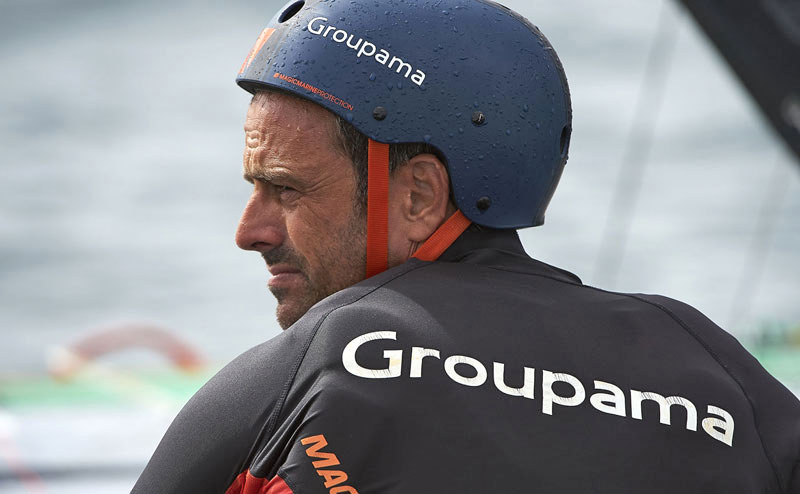
If most any of us weekend warriors fell off a boat while sailing and got hit by the rudder, we’d likely come away with a serious injury only if we took the blow with our head. But Franck Cammas is not a weekend warrior, the boats he trains on are not traveling at 6 knots, and their rudders aren’t thick and sturdy.
While training on a GC32 in Quiberon Bay, Brittany, on Monday, the 42-year-old French skipper of America’s Cup Groupama Team France got the catamaran up on her foils, accelerating briskly to 25 knots in a 17- to 18-knot westerly on flat seas. In the sudden surge of speed, Cammas lost his balance and fell overboard, hitting his right leg on the leeward hull’s blade-like rudder. At that speed, the sharp carbon edge cut deep.
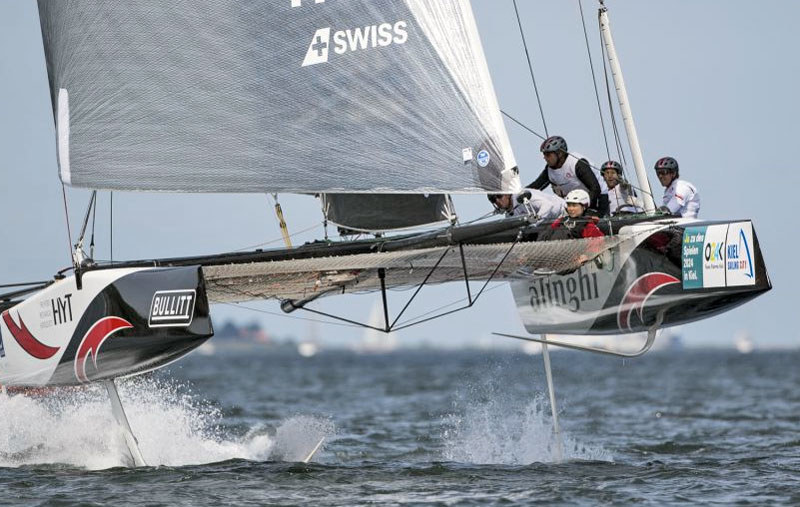
One of the crew grabbed the helm to avoid capsizing. Coach Bertrand Pacé, who was supervising the training session, got Cammas aboard his RIB as delicately as possible and headed to nearby Port Haliguen. The injured skipper was helicoptered to Nantes to take advantage of the best possible trauma care. Following several hours of surgery, doctors reassured Cammas that he will not lose the use of his foot — the arteries, nerves and tendons are unaffected. However, both the fibula and tibia were broken.
Although the Groupama Team France America’s Cup Challenge will go on, Cammas’ campaign for the 2016 Olympics will not. He and Sophie de Turckheim were hopefuls in the Nacra 17 multihull class.
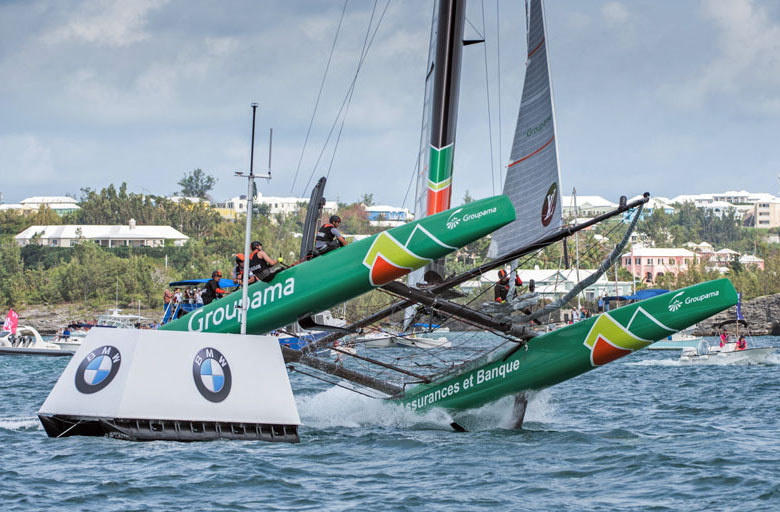
Among his many, many achievements in professional sailing, Cammas won the Transat Jacques Vabre in 2001, 2003 and 2007 (setting the record); the Route du Rhum in 2010; the Volvo Ocean Race in 2012; and the C-Class Catamaran Championship (aka Little America’s Cup) in 2013 and 2015. Skippering Groupama 3 — with the Bay Area’s Stan Honey serving as navigator — Cammas held the Jules Verne Trophy for two years. He had previously held the 24-hour distance record of 794 miles (an average speed of 33 knots) for two years. As a 24-year-old, he first came to glory in 1997 when he won the Solitaire du Figaro.
We wish Franck Cammas the best of success in his recovery and rehabilitation.
Blogging While Sailing at 30 Knots
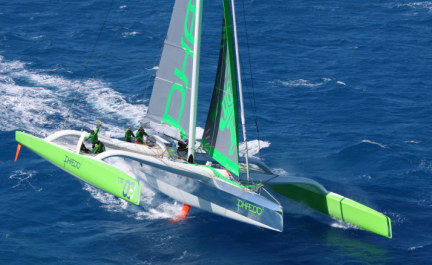
Brian Thompson, known to a number of Bay Area sailors for his time around here with Steve Fossett’s trimaran Lakota, sent the following report on the excitement of the Royal Ocean Racing Club’s 3,000-mile race from Lanzarote in the Canary Islands to Grenada in the Eastern Caribbean. He’s sailing aboard Lloyd Thornburg’s MOD70 Phaedo 3. Lloyd is from St. Barth but spends a lot of time in Newport Beach. Paul Allen of Santa Cruz is part of the crew.
"It’s pretty incredible sailing here, with MOD70 trimarans tearing across the Atlantic Ocean at 30 knots, spray flying everywhere, and long streaks of white wake shooting off our transoms.
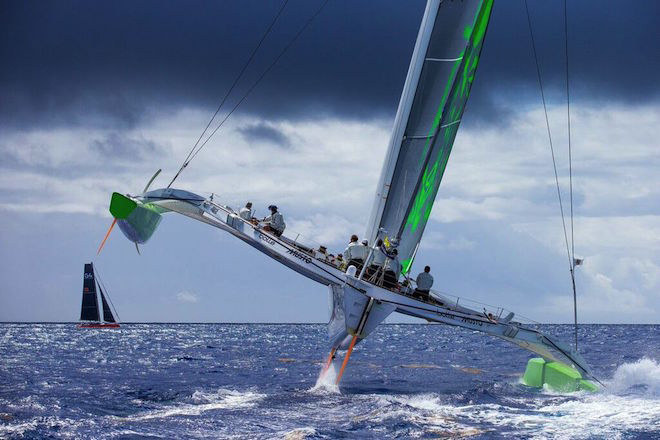
"It’s Master and Commander stuff across the high seas — playing cat and mouse with each other, dodging and fencing as we zig-zag downwind. Not to fire cannons and capture each other, but to be the first into Grenada, and to have beers ready for the second boat to the finish.
"Right now there is just 30 miles between us, which is hardly more than an hour’s sailing, so it’s incredibly close at the halfway mark of the course. We are now 1,500 miles from both Lanzarote and Grenada.
"Conditions are great — 19-23 knots of wind, puffy tradewind cumulus clouds, six-foot waves, which we are punching through at 30 knots. We first got into these conditions when we gybed at Mindelo in the Cape Verdes, and it was pretty full on. Spray everywhere on deck, and it was hard to even stand up down below. It was impossible to sleep. But we adapt, and now this is the ‘new normal’. Water shrieking off the propeller leg, boat jumping around as we bounce from wave to wave, and now we are sleeping fine in our off watch — until we have to gybe.
"We had better be used to it, as these are the conditions we’re going to have for the next 1,500 miles, which is a little less than three days of sailing on this boat. Everyone onboard is great, and loving driving this machine downwind in these conditions. It’s a challenge to keep it fast and safe, and it requires full concentration on the helm day and night.
"Flying fish are everywhere, and every hour or so one will land on the tramp and jump around before using one of the holes in the netting to dive headfirst back into the sea. Some are as big as good-sized trout, but not as good to eat. Anyway, better get out the sextant for the noon sight, break out all sail, holystone the decks and stay ahead of the pursuing Royal blue ship to the line!"
— Brian Thompson, skipper
Bye for now from Brian and the Phaedo crew.
Racing in a Cesspool?
The ‘aires‘ might be bueno in the capital of Argentina, but the agua apparently isn’t. Racing off the San Isidro area of Buenos Aires late last month, just outside the mouth of the Rio de la Plata, roughly a third of the competitors in the 49er and 49er FX Worlds reportedly fell ill due to serious gastrointestinal issues. Although organizers claimed that the six-day event came off "without a hitch," many sailors suffered from intense diarrhea, vomiting and fever — at least speculatively attributable to human fecal bacteria.
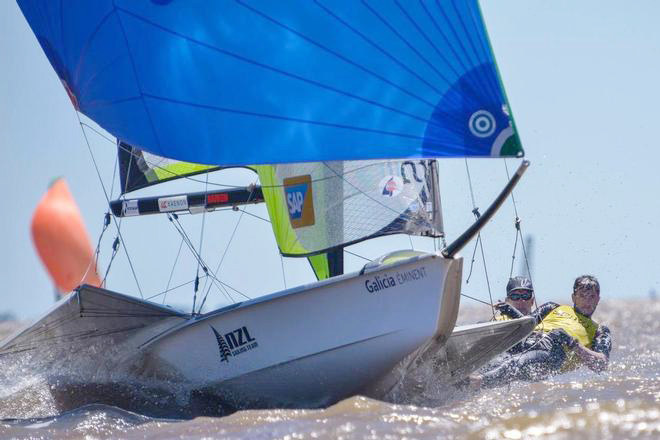
By week’s end, 49er Olympic Silver Medalists Peter Burling and Blair Tuke of New Zealand had taken top honors by a wide margin, with Aussies Nathan Outteridge and Iain Jensen (the 2012 gold medalists) coming from behind to squeak into second ahead of Spaniards Federico and Arturo Alonso. Jensen became ill after the first day of racing in the bay’s brown waters, and remained in such rough shape throughout the week that he reportedly stayed off the water, resting except during actual races — and then, he was ferried out to the course and back by powerboat.
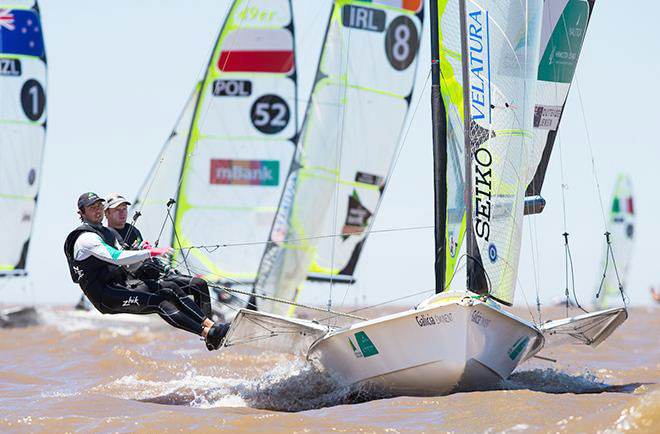
Although the 49er series is a mere footnote in the lives of most sailors, Buenos Aires’ pollution issues bring to mind similar health concerns about Rio de Janeiro, where the 2016 Olympic Games are slated to begin August 5, with sailing events taking place on Guanabara Bay. In the wake of serious health concerns, authorities there say they are taking measures to clean up the sailing venues. But the task seems monumental. As of last summer’s Olympic trials, only one of eight planned sewage treatment plants had been built.
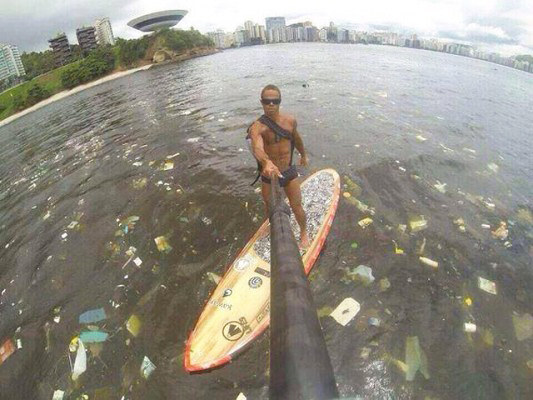
December Latitudes Out and About
The December issue of Latitude 38 hit the somewhat chilly docks of the San Francisco Bay Area yesterday, and has been shipped and mailed to ports beyond our horizon. Within the magazine’s pages, you’ll find a comprehensive recap of the Baja Ha-Ha, the second batch of profiles of Season Champions, tips and tricks for Mastering Mal de Mer, and Seeing Red with Max Ebb, plus Calendar, Letters, Sightings, Racing Sheet, World of Chartering, and Changes in Latitudes. Boat-shoppers, holiday-shoppers and window-shoppers alike will want to peruse the ads and Classy Classifieds.
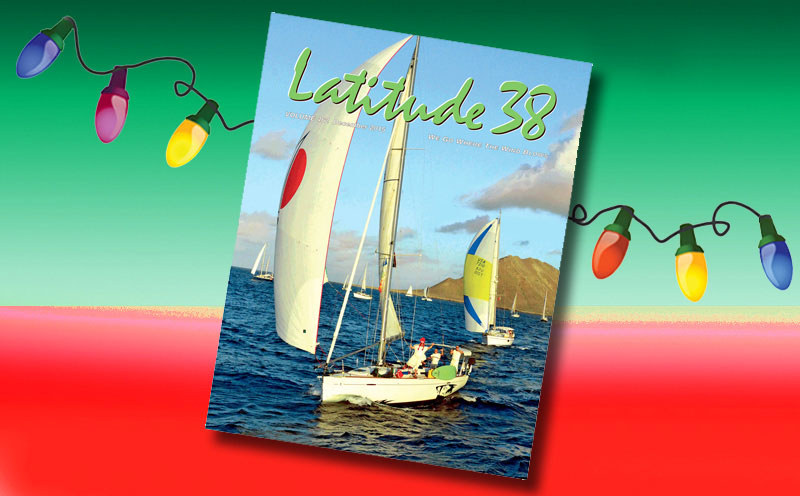
©Latitude 38 Media, LLC
We’re as accessible as a San Francisco breeze in summer. Pick one up at one of our distribution outlets, subscribe here, download it for free, or read it online.
